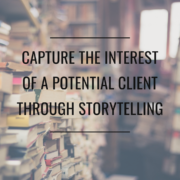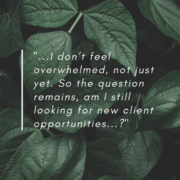Freelancers are always in search of a lead, attempting to attract attention from a potential client, trying to stand out from the crowd. There are many ways in which you can do this – hard sales, presenting an impressive portfolio of work, presenting the perfect pitch but have you ever thought about storytelling? More specifically, your story?
We all have a story that has led us where we are today. Whether it be personal or professional, we are here today because of what we’ve seen and done in our past. Our narratives are unique to us, it helps define our identity and in turn how others perceive us.
One of my favourite quotes from Seth Godin states: “People do not buy goods and services. They buy relationships, stories and magic”. That’s why I’ve put together a few reasons why you should consider incorporating your narrative into your brand.
 Stand out from the crowd
Stand out from the crowd
We are all selling something – whether it’s a product, a concept or a service. You have all the tools, the experience and the talent but if 100 freelancers are pitching for the same project. How are you going to persuade a potential client to hire you over the competition?
Nobody remembers facts and figures. In fact, people are 22 times more likely to remember a story than a fact or figure. We are all wired for stories – as children, it’s the main way we learn and share information and this continues throughout our adult lives.
Adding a personal narrative creates another layer to your pitches and at the very least, it will draw someone’s attention.
Add authenticity
Through a personal narrative, we become authentic. People see this authenticity and are naturally drawn towards it. They have confidence in an honest narrative because it’s a reflection of who you truly are.
It is important for a freelancer to remember that you are your biggest selling point. It’s often the case that people try to sell their service based on their expansive portfolio and years of experience. Although that is an important factor in pitching for projects, it may not resonate with a potential client.
Instead of focusing on the ‘what’ and the ‘how’ first, emphasise the ‘who’ and the ‘why’ – Who are you and why do you do what you do?
Injecting a narrative is easier than you think
There are many places that could do with some personal touches that would level-up your brand as a freelancer:
- On your website: If you have a website, this is where you have free reign to tell your story. The ‘about me’ page isn’t called that for no reason. It’s here that you can share your personal narrative. There is no need to go into great detail, but why not include a short anecdote of how you ended up as a freelancer. Who influenced you to go into your profession?
- Social Media platforms: This is undoubtedly the best place to share your own content as well as sharing someone else’s. If you are a lover of art, you can share articles on twitter that interest you. If your hobby is photography, a photography company may want to hire you for a marketing project.
- Pitches and cover letters: This is an opportunity for you to express not only your professional experience but to share your narrative and become more relatable. Remember, telling a story helps people relate to who you are and care more about your personal brand than any facts and figures.
Using the three-sentence structure
This is a very interesting way to capture the interest of a potential client so that they start to think about your story in their own imagination and fundamentally begin to relate or connect to you.
The three-sentence story structure:
- I believe
- Therefore I am
- And I am looking for / want to be able to help you…
Some call it an elevator pitch but what I like about this model is that it starts with a big statement that most people can relate to or want to be able to relate to. This means that they will start to visualise it in their own minds, putting themselves into your shoes and begin building empathy for you – therefore feeling emotion, therefore connecting.
Then, as you talk about what you are doing personally to support that big statement it is natural for the person who is listening to want to help. After all, we are helpful creatures and our brains are constantly trying to make sense of the patterns that we perceive around us.
And the last sentence will come as a surprise as well as a call to action – you are no longer talking about yourself, but the focus is on the person you are talking to. What’s in it for them? As we are also self-serving creatures, we want to know how we are expected to fit into the pattern or story that is unfolding in our brains and will be flattered that we can be a part of the story too.
In your notebook, play around with a few ‘I believe’ statements until you get a sentence that really resonates for you. The whole purpose of this session is to have your own personal script that you can stand behind.
Here are a few examples:
I believe that I can support the environmental and economic sustainability and the local community that I care about – all at the same time.
I believe that by supporting eco-friendly, sustainable and ethically sourced products, I can help my community today and build a legacy for tomorrow.
That is why I run a local shop in my community that sells eco-friendly, sustainable and ethically sourced products that contribute to supporting local initiatives (give a relevant example here) in the community. This way, everyone benefits/wins’.
I’m happy to put my own name and reputation behind my recommendations and purchasing decisions – because I trust these products, I know that they are good for people and for the environment – and this is a business platform that honours the same ideology that I have/ or that I believe in.
I am looking for people like you to get on board and work to create eco-enterprises, or to stock eco-friendly, sustainable and ethically sourced products in their shops.
Our personal success and happiness are based on the stories we tell ourselves and other people. Hone your personal narrative and integrate it into your brand.
 About the Author:
About the Author:
Bree Verity is the CEO of Arc Storytelling, she helps people find their narrative through 1:1 consultations.




 demanding-workload-copywritercollective
demanding-workload-copywritercollective  challengesoffreelancers-copywritercollective
challengesoffreelancers-copywritercollective 


